 Petzlover
Petzlover Mal-Shi is originated from United States but West Siberian Laika is originated from Russia. Mal-Shi may grow 31 cm / 12 inches shorter than West Siberian Laika. Mal-Shi may weigh 16 kg / 35 pounds lesser than West Siberian Laika. Both Mal-Shi and West Siberian Laika has almost same life span. Mal-Shi may have less litter size than West Siberian Laika. Mal-Shi requires Moderate Maintenance. But West Siberian Laika requires Low Maintenance
Mal-Shi is originated from United States but West Siberian Laika is originated from Russia. Mal-Shi may grow 31 cm / 12 inches shorter than West Siberian Laika. Mal-Shi may weigh 16 kg / 35 pounds lesser than West Siberian Laika. Both Mal-Shi and West Siberian Laika has almost same life span. Mal-Shi may have less litter size than West Siberian Laika. Mal-Shi requires Moderate Maintenance. But West Siberian Laika requires Low Maintenance
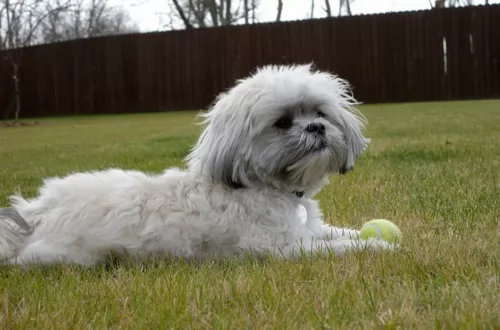 Small and pretty, the Mal-shi is a new crossbreed dog which originated in the United States and only recently - in the 1990s.
Small and pretty, the Mal-shi is a new crossbreed dog which originated in the United States and only recently - in the 1990s.
There hasn’t been much interest shown in developing this small dog into an independent breed, so most of these dogs are regarded as crosses from the two parent breeds – the Maltese Poodle and the ShihTzu.
Known as a designer dog he was also bred to be a low shedder. No breed clubs for this dog have been established and there are no breed standards either.
 The West Siberian Laika come from the Khanty and Mansi tribes of West Siberia and Ural. They are a primitive breed used for hunting and come from the spitz and wolf lines. They retain many of their primitive looks and traits to this day. They were pre-historic companions to human hunters and remain so today in the northern regions of the Russia. They were never sled dogs but pure hunters throughout their journey to a domesticated breed. They hunted in the forests of the mountainous regions and were adapted to hunting in the woods. When their prey was hunted almost to extinction, the Laikas were also in danger of disappearing.
The West Siberian Laika come from the Khanty and Mansi tribes of West Siberia and Ural. They are a primitive breed used for hunting and come from the spitz and wolf lines. They retain many of their primitive looks and traits to this day. They were pre-historic companions to human hunters and remain so today in the northern regions of the Russia. They were never sled dogs but pure hunters throughout their journey to a domesticated breed. They hunted in the forests of the mountainous regions and were adapted to hunting in the woods. When their prey was hunted almost to extinction, the Laikas were also in danger of disappearing.
From the early days of the 1900’s through the first World War, there were several campaigns to save the WSL from extinction. A breed standard was developed around the 1930’s. Following the war the breeding programs became more uniformed and followed the standard that was in place. World War II disrupted it again, but once again it was resumed after the war.
The breed was once again threatened by industrialization and deforestation in the early 20th century, as they were replaced by newer, more popular breeds. There were thought to be dozens of aboriginal Laikas with various groups attached to different groups of indigenous hunters.
Following the second World War and the ever increasing detail of breed standards, the Laikas were divided into four pure bred groupings: the West Siberian Laika, the East Siberian Laika, the Russ-European Laika and the Karelo-Finnish Laika. All of these breeds are Laikas because they are bark pointing hunters.
They were imported to the U.S. in the early 1990’s by a Russian immigrant. Vladmir Beregovoy is credited with bringing the breed to the States. There are now about 300-400 West Siberian Laika’sin the U.S. They are a very emotional breed, very in touch with his human’s feelings, habits and intentions. He is a barker for sure who hates to be left alone. An intense breed with the need for companionship and a purpose. They will do anything to escape a pen if left alone for long periods of time.
The breed is protective of its people with other animals and some are wary of strangers. He needs an active family to match his active spirit. They will bark at all wild life including all the squirrels in your yard. So if don’t want a “barker”, don’t get a West Siberian Laika.
They are recognized by the United Kennel Club, the American Canine Association the Dog Registry of American and the Federation Cynologique Internationale
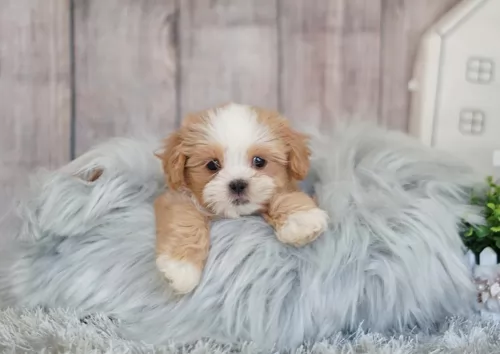 The Mal-Shi is a small dog standing at around 25–30 cm in height and weighing between 3 and 7kg. As a designer dog he has a low-shedding coat of many colors – white, black and white, white and apricot and brown.
The Mal-Shi is a small dog standing at around 25–30 cm in height and weighing between 3 and 7kg. As a designer dog he has a low-shedding coat of many colors – white, black and white, white and apricot and brown.
The coat is usually soft and silky and slightly wavy and it can grow long if left untrimmed. Most people take their pets to a professional groomer to be cut.
The skull of the dog is domed, he has small ears which can be half-erect and half-floppy.The tail is long and fairly feathery. Sometimes the dog inherits the underdeveloped tear duct of the Maltese and then there is that usual tear-staining around the eyes.
THE Mal-Si is such a cute little dog, making him a splendid pet for children and he is more than happy to be cuddled and petted. Small and active, he is adaptable and will live easily in the city or the countryside, as his exercise needs aren’t that demanding. He basically requires a walk each day and will love some ball games both inside and outdoors.
He is an extrovert and also an entertainer, and his amicable nature allows him to get along with other pets in the home. However, contrary to what he looks like, he is a bold dog, social and also intelligent, making him easy to train.
It is to any owner’s advantage to have a little dog like this trained and socialized, even though he is so good natured. He makes a great therapy dog too. When the Mal-Shi is at home he’s an affectionate, loving dog who just wants to spend time in the company of his human family.
As a companion dog, he won’t do well when left for hours on end on his own. Dogs are social creatures, and they can battle with separation anxiety when left alone for too long. Every dog owner needs to think of this before investing in a dog.
 The WSL comes from the Spitz line and also directly descendent from the wolf. They look and act a lot like a wolf in many ways. They have retained much of their primitive traits. With a pointed, long muzzle, an almost square head, and square body, they have wolf colored coats of gray and red. They are mostly medium in size but some can be smaller or larger. Their head is shaped like a wedge, their eyes are typical almond shape and set deep in their head. They are brown or even darker. The muzzle is almost as long as the skull. Their lips are thin and black. The ears are straight up and pricked.
The WSL comes from the Spitz line and also directly descendent from the wolf. They look and act a lot like a wolf in many ways. They have retained much of their primitive traits. With a pointed, long muzzle, an almost square head, and square body, they have wolf colored coats of gray and red. They are mostly medium in size but some can be smaller or larger. Their head is shaped like a wedge, their eyes are typical almond shape and set deep in their head. They are brown or even darker. The muzzle is almost as long as the skull. Their lips are thin and black. The ears are straight up and pricked.
They have bodies longer than they are tall with a lot of musculature. They carry their tail high over their backs. With straight legs and forward feet, with gray, red and white coats, they still look like wild dogs.
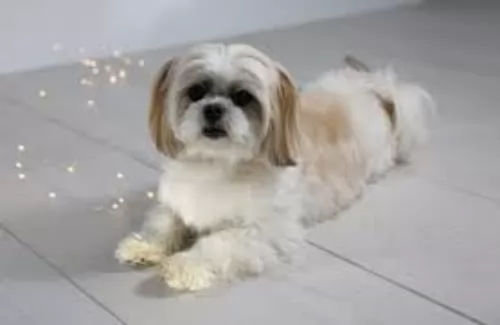 The Maltese Shih Tzu is an attractive little dog who is guaranteed to make you a splendid pet. Those who have owned both Maltese and Maltese Shih Tzu will tell you that the temperament of this dog is more amicable than that of the Maltese.
The Maltese Shih Tzu is an attractive little dog who is guaranteed to make you a splendid pet. Those who have owned both Maltese and Maltese Shih Tzu will tell you that the temperament of this dog is more amicable than that of the Maltese.
With his amicable nature, he is willing to be everyone’s friend, and he makes a particularly good choice for elderly people.
Being such a people-dog, the Maltese Shih Tzu's greatest joy comes from being petted and taken notice of by his human family. He can’t bear to be left for long periods of time. Like any other dog, he will require training and socialization, requiring a firm, balanced, consistent, fair owner.
Cheerful and good-natured, when he is loved to the moon and back, this little dog promises to make you and exceptional best friend.
 3.Adaptability This is not really an apartment dog though he can adapt. He needs outdoor space to run everyday. So if in an apartment find a dog park for everyday use.
3.Adaptability This is not really an apartment dog though he can adapt. He needs outdoor space to run everyday. So if in an apartment find a dog park for everyday use.
4.Learning ability – Highly trainable and very smart. Independent thinker though might cause some issues.
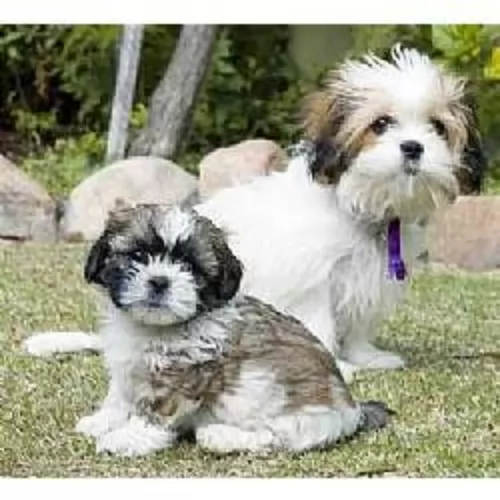 The Maltese Shih Tzu is a robust little dog, and with good care he can live to be anything between 10 to 15 years of age.
The Maltese Shih Tzu is a robust little dog, and with good care he can live to be anything between 10 to 15 years of age.
There are some health issues you want to be aware of with this particular dog breed.
Your little canine friend can have respiratory problems because of him being a flat-faced breed. Known as brachycephalic dogs, these dogs can have breathing difficulties. They are usually fine when resting, but during exercise or if they become too hot, they battle with breathing. It makes them more prone to heatstroke, so it is important to keep dogs like this cool and calm.
This is actually a common problem in small dogs - dislocation of a bone at a joint. Patellar luxation is when the knee joint slides in and out of place, causing pain.
This is a disease which is seen in the Shih Tzu and Maltese. Symptoms include uncontrollable shaking and tremors. These can continue all day. The illness is worse during times of stress and there may even be difficulty with walking. The cause is unknown but he will certainly need to get to the vet.
 Health wise there are no genetic health issues known today. Since they were so wild, primitive and isolated there was not a lot of inbreeding to any standards. There are however some interesting health facts about the WSL.
Health wise there are no genetic health issues known today. Since they were so wild, primitive and isolated there was not a lot of inbreeding to any standards. There are however some interesting health facts about the WSL.
• Females only come into estrus once a year, usually in the late winter. They are usually one to two or two and a half years old when this happens. The Russians who know them best frown on breeding them before they are at least two.
• They are subject to many of the same parasites and some diseases like any other canine. But they are not susceptable to any illness specific to their breed.
• Hunting accidents might bet he biggest health threat this breed faces at the moment.
• However with more dogs being bred for the show ring, this could all change and genetic issues could begin to pop up for them.
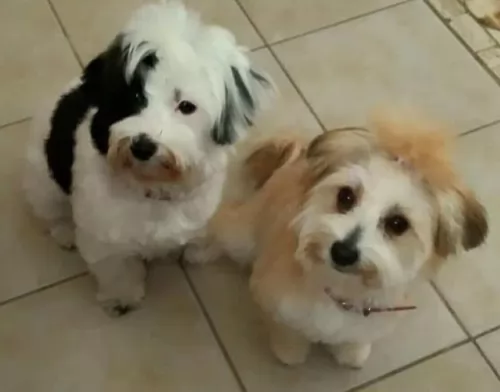 The Mal-Shi is a small dog and will require eating two small meals a day. An adult Mal-Shi will eat according to his age, size and activity levels.The quality of the dog food you buy will make a huge difference to his wellbeing. The better quality foods – those without preservatives, colorants and fillers will ensure good health and longevity for your pet.
The Mal-Shi is a small dog and will require eating two small meals a day. An adult Mal-Shi will eat according to his age, size and activity levels.The quality of the dog food you buy will make a huge difference to his wellbeing. The better quality foods – those without preservatives, colorants and fillers will ensure good health and longevity for your pet.
Don’t just give him dry kibble every time – mix in some chopped up cooked chicken, brown rice and vegetables. Remember that some vegetables like onion can be bad for your pet.
Dogs love simplicity, and feeding your dog these simple foods will ensure you don’t battle with upset stomachs. Make sure you always have a bowl of fresh, cool water available for your pet.
Trim his nails when they get long and don’t wear down naturally.
Check his ears for redness, itchiness and discharge which could indicate an ear infection.
If you have him professionally groomed, you will still need to brush him twice a week. It’s also your time to check him over for ticks and fleas and any unusual lumps.
 performance, working dog food. High in protein and fat is needed to maintain their lean muscle. Don’t over feed them as they will become obese and they will be unhappy if their physical activities are restricted, even if by their own weight. Be sure you break up their day’s food amount into 3-4 smaller meals.
performance, working dog food. High in protein and fat is needed to maintain their lean muscle. Don’t over feed them as they will become obese and they will be unhappy if their physical activities are restricted, even if by their own weight. Be sure you break up their day’s food amount into 3-4 smaller meals.
2.Feeding the adult – Almost everything is equally true for the adult. They need a high protein and high fat food – a high performance food. Don’t over feed and give them at least 2 meals per day.
3.Points for Good Health – as previously mentioned this is a hardy and robust breed,
4. Games and Exercises They need a lot of exercise, have a strong prey drive and are very intelligent. A dog with those traits that does not get enough exercise will drive you crazy if he is not stimulated.